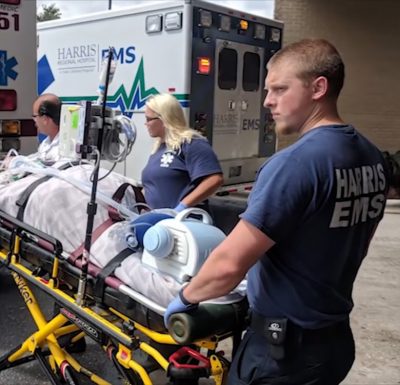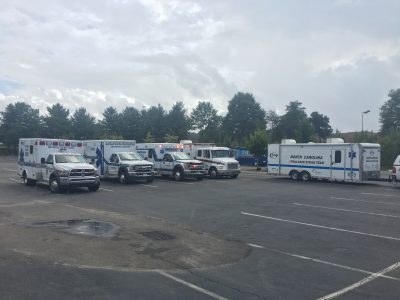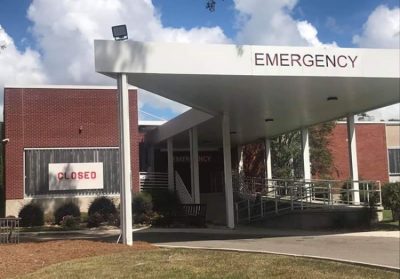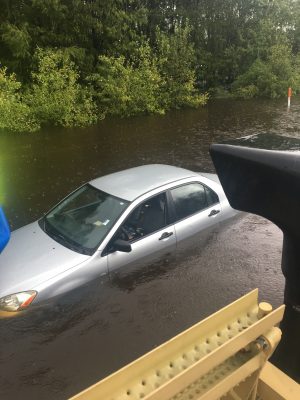On the front lines of Hurricane Florence: A Gillings student goes to work
November 5, 2018
Nathaniel (Nate) Andrews is a paramedic in the mountains of western North Carolina.
He’s also a Master of Healthcare Administration student at the UNC-Chapel Hill Gillings School of Global Public Health. Below, he shares his first-hand account of helping citizens as Hurricane Florence loomed over, swept through and ultimately left destruction across the eastern part of the state.

Nate (at right) readies a critical patient for an emergency flight on a Blackhawk helicopter.
As it became increasingly clear that Florence was going to hit the N.C. coast, I told my boss I wanted to go Down East if the state requested Emergency Medical Services (EMS) crews to respond. Twelve hours later, I was assigned to an ambulance strike team from western North Carolina. Our team included four ambulances, an evacuation bus and a trailer carrying supplies we might need for the mission.
At noon on September 11, we deployed for our first assignment – evacuating Pender Memorial Hospital. We successfully evacuated 40 patients from the rural facility in just 3.5 hours.
The next day, we deployed from the Regional Communications Center in Kinston, N.C., and were assigned to assist with 911 services in Columbus County. We arrived at our assignments on September 13. Hurricane Florence made landfall the next morning.

Nate’s ambulance strike team prepares for deployment.
During my time in Columbus County, our strike team performed a variety of tasks. We:
- evacuated several nursing homes;
- operated Advanced Life Support services in multiple municipalities around the county;
- worked in cooperation with Whiteville Rescue to relieve their crews and deliver 911 services to the community;
- safely evacuated 11 people and three pets from severely flooded neighborhoods; and
- flew a critical patient on a Blackhawk helicopter to Union County for emergency surgery.
The list could go on.

A rural hospital displays a “Closed” sign.
Our assignment lasted eight days. During that time, we had many triumphs and shared a lot of laughs and smiles. We gracefully overcame adversity, such as the county communications shutting down, or all major roads and highway systems being underwater for days.
While I was deployed, I witnessed natural destruction like I had never seen. I met many citizens affected; some of whom were broken by the loss of all they had and others who somehow maintained inspirational optimism in the face of adversity.
I am proud to have served my state. I am immensely proud to have served alongside great men and women during our mission. I do not share my experience to seek thanks or gratitude, but rather to shed light on the broken communities I witnessed.

Nate’s team passes a submerged car on the highway.
Much of Columbus County was heavily damaged and/or flooded during Hurricane Matthew two years ago. For example, the town of Fair Bluff, in the western part of Columbus County, experienced flooding so great that many citizens moved away. Only two businesses in the town have reopened since Matthew. When our strike team left Columbus County on day seven, Fair Bluff was under 18 inches of water and the flood waters were expected to rise another 12 inches at peak crest.
This is just one example of a community that had only begun to recover from the last major storm and now must rebuild again.
Many North Carolinians have been impacted by Hurricane Florence, including my family, close friends and some of my fellow classmates. The recovery process will be long, but Tar Heels are resilient during difficult times. I thank everyone who has donated their hours, supplies and hard work to coastal recovery efforts.
Again, I do not share my experience to boast upon the efforts of my team. I hope to shed light on the great need that remains for our recovering coastal counties.
